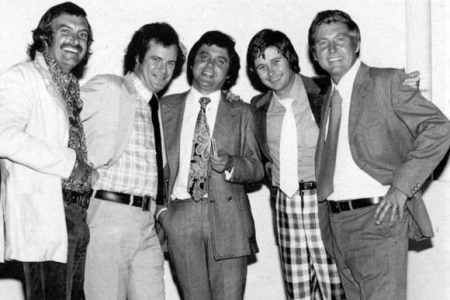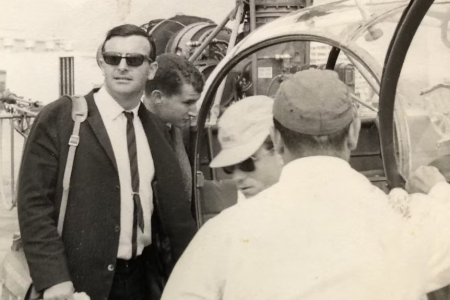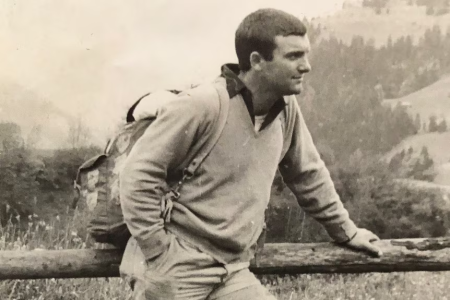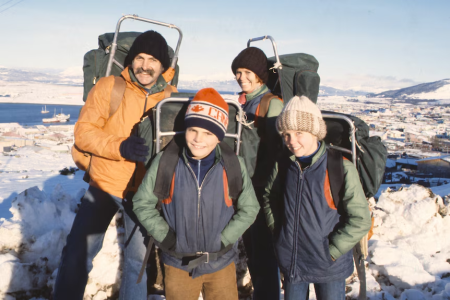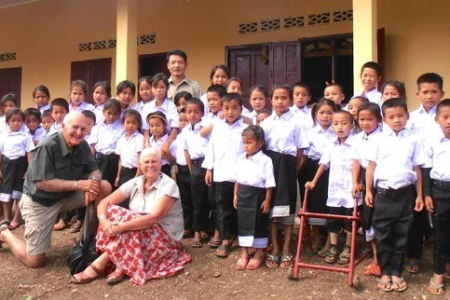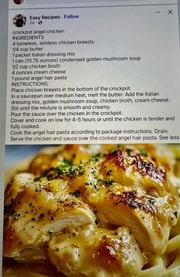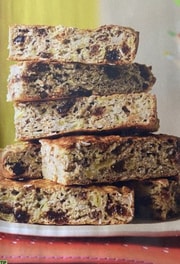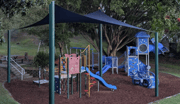Former ABC journalist Iain Finlay dies aged 89, choosing voluntary assisted dying
By
ABC News
- Replies 22
Former ABC correspondent Iain Finlay was as curious about death as he was about life.
'I've always been interested in the unanswerable questions — life, death and the whole darn thing,' he said.
'I look on birth and death as being the two great adventures of life.'
Mr Finlay, 89, opted for voluntary assisted dying yesterday at his home at Tumbulgum in the Tweed Valley, northern NSW.
His partner of 60 years, Trish Clark, and children Zara and Sean were by his side.
Mr Finlay was a staple on Australian television and radio, reporting for This Day Tonight in the 1960s and 70s, as well as AM and Beyond 2000.
He worked as a foreign correspondent and interviewed luminaries including Ella Fitzgerald, Muhammed Ali and Richard Nixon.
Treatment for amyloidosis
Sitting in the sun on his verandah on Monday, Mr Finlay said he began looking into voluntary assisted dying some years ago 'to deal with things in a sensible way'.
He had been participating in a trial for amyloidosis, a rare disorder in which amyloid protein builds up in the organs and can lead to their failure.
When it became clear the treatment was not working, he 'sorted out' his end-of-life plan.
Former ABC report Iain Finlay reporting in the 1960s.
'There is no doubt this is an effort to control aspects of dying, having it administered to you at a particular time when your family can be there.
'It's going to be very traumatic for them, I suppose, even more than me.'
Ms Clark said the family had taken the time to make peace with the decision.
She said she and her husband had made a lifetime of happy memories together and he would be greatly missed.
'I'm not looking forward to it all, I hope I can still stand up tomorrow, and the day after.'
A life lived with curiosity
Born in 1935 in Canberra, Mr Finlay's early life saw him educated at schools across Australia and overseas.
His father was a military man who was appointed aide-de-camp for Governor-General Sir Isaac Isaacs and took up posts across the world, though the family did not travel with him.
Still, the urge to travel was strong in young Iain.
He left home at 18 bound for Europe, then hitchhiked across Africa where he worked in mining for a few years, landing a job with a bit of help from author Bryce Courtenay.
After a stint as South-East Asia correspondent for the ABC and eight years with This Day Tonight, he, Trish and their young family set off on backpacking adventures that took them across Africa, South America, Europe and the Pacific.
Their travels formed the basis of a number of books written by the couple.
In later years, their passion for travel saw them forge connections in Laos, where they contributed to the establishment of a rural primary school.
Iain Finlay said instilling a sense of adventure and curiosity for the world in his children and grandchildren was one of his greatest sources of pride.
'Death is an adventure because you don't know, you are going into the unknown.'
The family has planned a funeral celebrating his life, to be held this Friday.
Written by Hannah Ross, ABC News.
'I've always been interested in the unanswerable questions — life, death and the whole darn thing,' he said.
'I look on birth and death as being the two great adventures of life.'
Mr Finlay, 89, opted for voluntary assisted dying yesterday at his home at Tumbulgum in the Tweed Valley, northern NSW.
His partner of 60 years, Trish Clark, and children Zara and Sean were by his side.
Mr Finlay was a staple on Australian television and radio, reporting for This Day Tonight in the 1960s and 70s, as well as AM and Beyond 2000.
He worked as a foreign correspondent and interviewed luminaries including Ella Fitzgerald, Muhammed Ali and Richard Nixon.
Treatment for amyloidosis
Sitting in the sun on his verandah on Monday, Mr Finlay said he began looking into voluntary assisted dying some years ago 'to deal with things in a sensible way'.
He had been participating in a trial for amyloidosis, a rare disorder in which amyloid protein builds up in the organs and can lead to their failure.
When it became clear the treatment was not working, he 'sorted out' his end-of-life plan.
Former ABC report Iain Finlay reporting in the 1960s.
'There is no doubt this is an effort to control aspects of dying, having it administered to you at a particular time when your family can be there.
'It's going to be very traumatic for them, I suppose, even more than me.'
Ms Clark said the family had taken the time to make peace with the decision.
She said she and her husband had made a lifetime of happy memories together and he would be greatly missed.
'I'm not looking forward to it all, I hope I can still stand up tomorrow, and the day after.'
A life lived with curiosity
Born in 1935 in Canberra, Mr Finlay's early life saw him educated at schools across Australia and overseas.
His father was a military man who was appointed aide-de-camp for Governor-General Sir Isaac Isaacs and took up posts across the world, though the family did not travel with him.
Still, the urge to travel was strong in young Iain.
He left home at 18 bound for Europe, then hitchhiked across Africa where he worked in mining for a few years, landing a job with a bit of help from author Bryce Courtenay.
After a stint as South-East Asia correspondent for the ABC and eight years with This Day Tonight, he, Trish and their young family set off on backpacking adventures that took them across Africa, South America, Europe and the Pacific.
Their travels formed the basis of a number of books written by the couple.
In later years, their passion for travel saw them forge connections in Laos, where they contributed to the establishment of a rural primary school.
Iain Finlay said instilling a sense of adventure and curiosity for the world in his children and grandchildren was one of his greatest sources of pride.
'Death is an adventure because you don't know, you are going into the unknown.'
The family has planned a funeral celebrating his life, to be held this Friday.
Written by Hannah Ross, ABC News.

